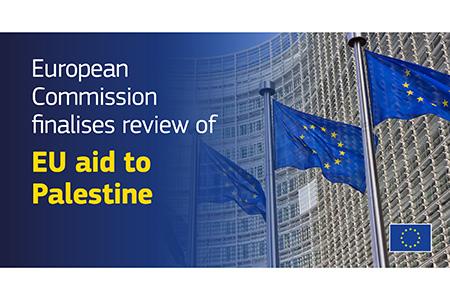
Today the Commission published the results of its review of the ongoing EU financial assistance for Palestine, announced two days after the Hamas’s terrorist attack on Israel on 7 October.
President of the European Commission, Ursula von der Leyen, highlighted, that “The EU is the largest international donor of aid to the Palestinians. After the terrible events of 7 October, a careful review of our financial assistance was necessary. This review has confirmed that the safeguards in place are effective. Work is now ongoing on the design of our future support to the Palestinians in view of the changing and still evolving situation.”
The review has shown that the Commission controls and existing safeguards in place- which have been significantly strengthened in the past years – work well and no evidence has been found to date that money has been diverted for unintended purposes.
The review followed a two-step approach. First operational screening took place to assess the feasibility of projects in the light of the new situation on the ground. Under this step, the review has identified a list of non-feasible projects for an amount of €75.6 million, which will be reprogrammed in support for Palestinians in light of new priorities to be identidied on the ground. It concerns mainly large infrastructural projects, including Gas for Gaza, the Gaza Desalination plant and access to water services, whose implementation is not feasible in the current context.
As part of the second step, the Commission carried out a risk assessment, for which all implementing partners were requested to provide information about their control mechanisms in place. In the current context, the Commission has identified some additional measures, such as the inclusion of relevant anti-incitement contractual clauses in all new contracts and ensure the monitoring of their strict application at all times. This could notably be performed through a third-party monitoring of the beneficiaries.
While additional information is being sought from all grant beneficiaries and pillar assessed organisations in order to assess if possible adjustments might be necessary, ongoing support will continue to be implemented with the organisations which have provided the clarifications requested and reassurances on the safeguards in place, notably EU Member States Agencies and International Financial Institutions. Beneficiaries subject of allegations of incitement to hatred and violence after the 7 October 2023 events were requested to comment on the allegations brought against them. This concerns notably two projects with Civil Society Organizations. Payments will be processed once satisfactory clarifications have been provided, in line with the Financial Regulation.
Background
The review covered the entire development portfolio, including support programmes to the Palestinian population, the Palestinian Authority, the United Nations Relief and Works Agency for the Palestinians (UNRWA), as well as relevant programmes of other Commission services such as Erasmus+. It did not concern humanitarian assistance for the Palestinian people.
The objective of this review was first of all to ensure that in the changed circumstances no EU funding indirectly enables any terrorist organization to carry out attacks against Israel; secondly, to ensure the full respect for EU legislation and policy, as well as preventing the possible abuse of EU funding to incite hatred and violence; and thirdly, to assess whether the support programmes would need to be adjusted in light of the current circumstances.
The review followed a methodology in two steps: an operational screening of the feasibility of projects, and a risk assessment on possible aid diversion and incitement to hatred and violence perpetrated in the framework of the implementation of projects. The screening of the projects has been carried out according to objective criteria for both the phases. Beneficiary organisations were consulted on these aspects.
The European Union is the biggest provider of external assistance to the Palestinians through the European Joint Strategy (EJS) 2021-2024, which amounts to almost
€1.2 billion indicatively, of with €691 million have already been adopted. This includes direct contributions to the Palestinian Authority through the PEGASE mechanism, support to civil society organisations (CSOs), projects through International financial institutions (IFIs) and contributions to the United Nations Relief and Works Agency for the Palestinians (UNRWA).
For more infomation
Communication to the Commission : Review of the ongoing financial assistance for Palestine
Quote(s)
The EU is the largest international donor of aid to the Palestinians. After the terrible events of 7 October, a careful review of our financial assistance was necessary. This review has confirmed that the safeguards in place are effective. Work is now ongoing on the design of our future support to the Palestinians in view of the changing and still evolving situation.
Ursula von der Leyen, President of the European Commission
The changed circumstances due to the terrorist attack by Hamas against Israel on 7 October required the Commission to conduct feasibility and risk assessments regarding our development portfolio, in line with our obligation to ensure the correct implementation of the EU external funding. Since these developments imply additional risks, the Commission is introducing further mitigating measures to strengthen the application of our existing safeguards.
Olivér Várhelyi, Commissioner for Neighbourhood and Enlargement






